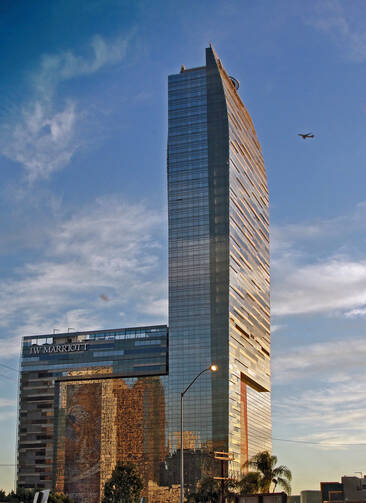Over the summer I read an interview with Bill Marriott, in which the 82-year-old chairman of Marriott International discussed shifts and trends in the hotel industry and how Marriott is keeping up with them. It was impressive, and it left me with all sorts of thoughts about innovation and what it takes for successful institutions to adapt and flourish. An excerpt:
Over the years, Mr. Marriott has seen a seismic change in his business. "Today is a whole new ballgame for me," he says. "When I went to hotels when I was young, you went into the lobby, you checked in at the desk, and if you were hungry, you went to the restaurant and sat at the counter and had a hamburger," he says. "Now, you check into your room, drop your luggage and go back to the lobby to use your computer or meet your friends."Seven years ago, in response to changing patterns, Marriott launched a program called "The Great Room" that raised the ceilings in hotel lobbies and expanded the seating areas to give customers a central place to work and socialize.
In addition to conducting focus-group research, Mr. Marriott says the company now pulls data from social media. For example, it asks guests for ideas of how to improve travel. When one wrote back asking for healthy vending machines, the company flew her to London to find items in farmers' markets that could be stored in a machine. Marriott plans to launch the first of its new nutritious vending machines—with items such as fresh fruit and energy bars—in Chicago this fall.
Marriott has also redesigned hotel rooms in its newer brands based on what customers want today. Millennials live out of their suitcases, Mr. Marriott says, so the company has made closets smaller and TVs and bathrooms bigger. It has gotten rid of in-room desks in many hotels. And a new line of Edition hotels—a collection of contemporary properties in London and Istanbul, with two more locations coming by the end of 2015—emphasizes the hotel's lounge and restaurant scene over the rooms. (The brand is a collaboration with Ian Schrager. ) Over 50% of the Edition brand's revenue comes from food and beverage rather than from room fees.
Marriott is also responding to a trend very much present in Western private school education today: interest from China.
Last year, [Mr. Marriott] says, 100 million Chinese traveled out of the country, and by 2020, that number is expected to double. In response, Marriott has launched programs to teach more desk clerks to speak Mandarin. "We've got to get ready for them, and we've got to provide them with good Chinese food and menus in Chinese, especially in gateway cities like San Francisco, New York and Chicago," he says. "They want to shop, they want to go downtown, and they spend two to three times more on a trip more than we spend."His family foundation is also sponsoring an initiative with 25 hospitality schools in China to train staff to work in the 350 hotels he plans to open in Asia in the next four years. "We're opening a hotel a week there for the next three to four years," he says.
The Marriott interview left me intrigued by how much Marriott has done to remain a leader in their field (I'm sure their competitors do the same). Marriott, like all successful businesses, has to adapt and innovate or else their hotels won't survive. They have to track data, listen to customers and imagine what travelers want not only today but 20 years from now. If Marriott built rooms and lobbies like they did in the 1970s, guests would book elsewhere.
And yet, Marriott must strive to remain Marriott. The spirit of modernization cannot destroy the uniqueness of the Marriott brand and the company's core values.
There are parallels, I think, for education—especially private education, which has to continually justify itself to parents and students, which can never take its survival for granted. If principals and presidents, and board chairs and development directors, had to think like Marriott International, what changes would we want and need to see? What innovations would we have to introduce—in the curriculum, in teacher formation, in the layout of campus and in every other area?
What are the trends to which we need to pay attention? A number of schools, for example, are face rising interest from Chinese students. How should this affect teacher hiring and formation?
With increasing concerns about the long-term effects of concussions, how will that affect school sports?
And how do we think inventively without sacrificing what shouldn't change?








